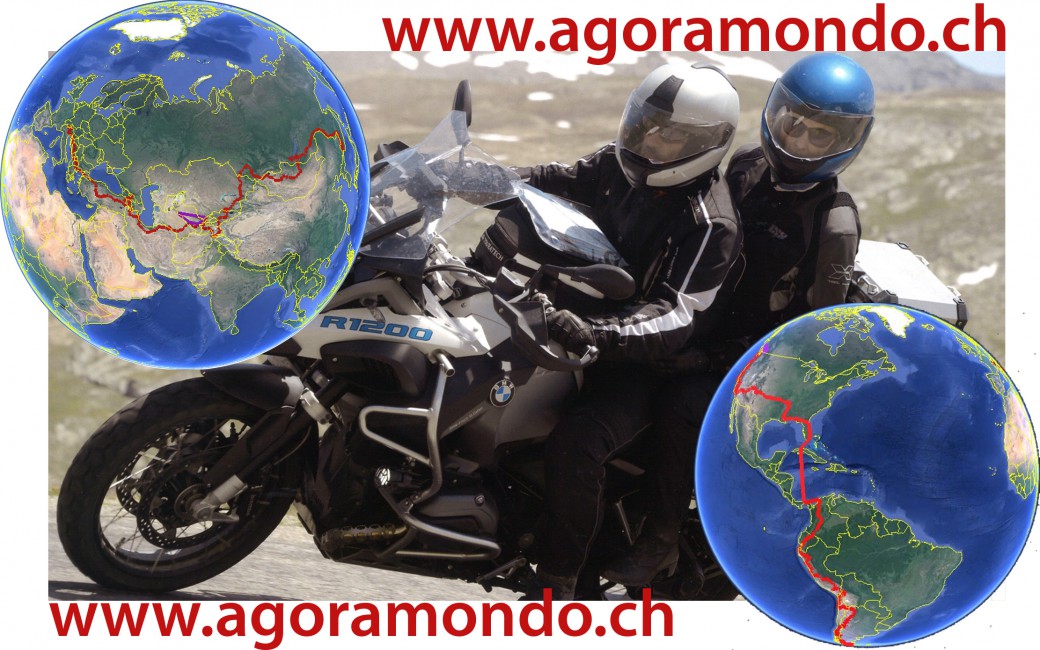Welcome – Benvenuti! – Willkommen!
AGORA – luogo d’incontro: fra le idee all’origine del viaggio vi era proprio quella di poter conoscere la gente… Ecco dunque alcuni ritratti di chi ha arrricchito il nostro girovagare.
AGORA – meeting place: among the ideas at the origin of our trip one was just to be able to know people … Here you find some portraits of who enriched our travelling.
AGORA – Treffpunkt: Unter den Ideen am Ursprung unserer Reise war eine besonders wichtig: Leute kennen lernen… Hier nun einige Protrait von Leuten, die uns bereichert haben.
SASA and SAFET,from Bosnia Herzegovina, met in Khalaikum (Tagikistan) |
We sit at the bar and drink a cold beer. Two interesting men appear and invite us to have another drink. Sasa and Safet work for an NGO, the Norwegian People’s Aid, and are demining the territory from the devices left by the Russians. The meeting is extremely interesting and it goes on during the dinner, accompained by a good bottle of wine. Sasa and Safet are Bosnians, the first of Serpska Republic, the second is Muslim. During the Civil War they were on opposite sides, now they are friends and together they do this difficult work, particularly Safet which has already been everywhere on the world. Both have their family in Bosnia and go back only for the holidays. Safet tells of the difficulties with his adolescent daughter and afterwards, laughing, he says that fortunately Sasa was not a good soldier, otherwise he would not be alive today. They tell us – especially Sasa, the more ‘intellectual’ and restless – the story of the civil war in Yugoslavia and the difficulties in finding a reconciliation.
Thank you Sasa and Safet for the great work you are doing and also for being an example that reconciliation is possible.
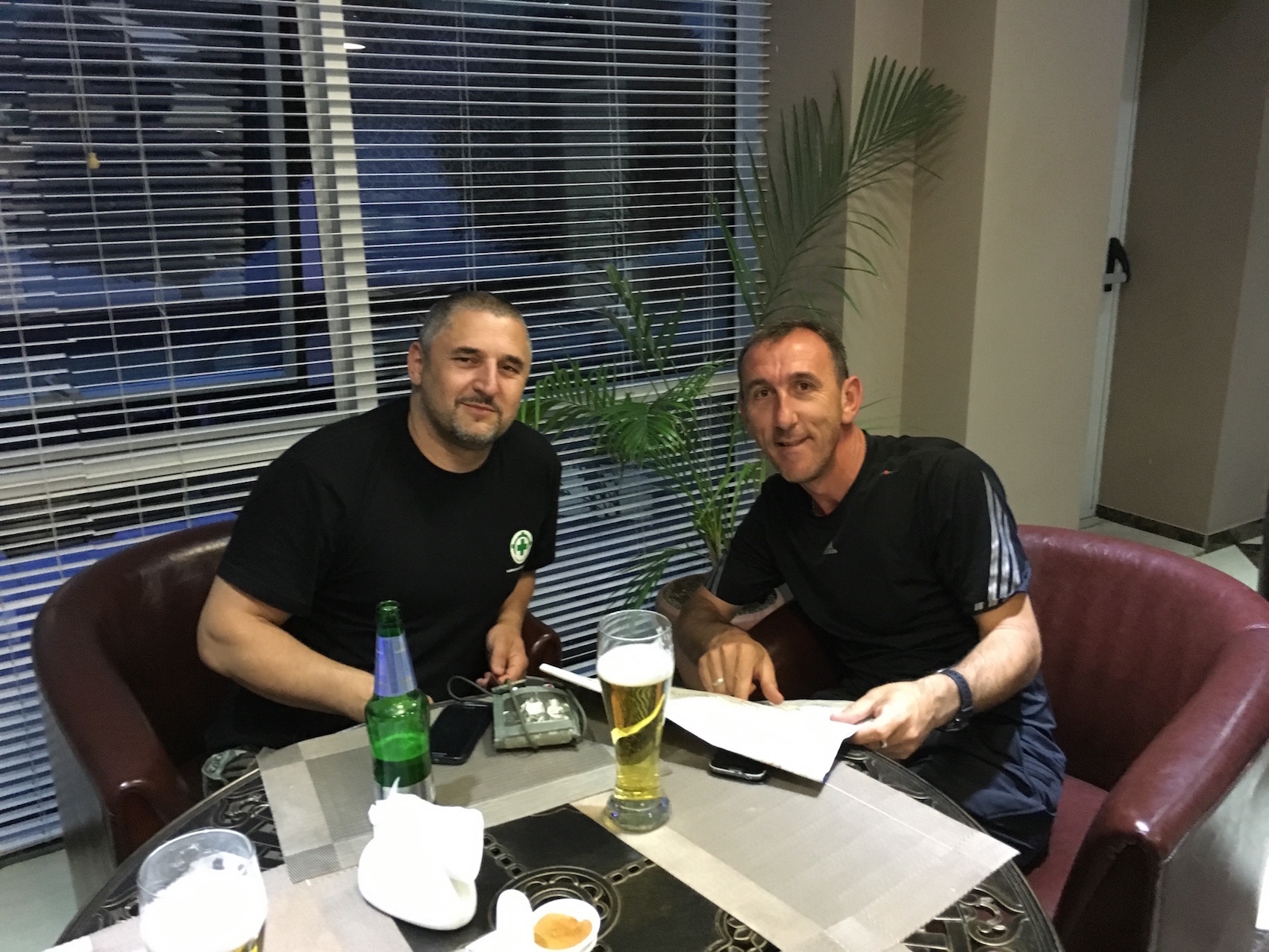
SASA and SAFET
Ci sediamo al bar per berci una birra fresca ed ecco che appaiono due simpatici uomini che, in inglese, ci invitano a berne un’altra. Sono Sasa e Safet, lavorano per una NGO, la Norwegian People’s Aid, e stanno sminando il territorio dagli ordigni lasciati dai russi. L’incontro si fa estremamente interessante e continua a cena con un’ottima bottiglia di vino. Sasa e Safet sono bosniaci, il primo della Repubblica Serpska, il secondo invece è musulmano. Durante la guerra civile erano su fronti opposti, oggi sono amici e svolgono ormai da anni questo difficile lavoro, in particolare Safet che è già stato un po’ dappertutto. Entrambi hanno famiglia in Bosnia e rientrano solo per le vacanze. Safet racconta delle difficoltà che ha con la figlia adolescente e poi, ridendo, mi dice che per fortuna Sasa non era un buon soldato, altrimenti oggi non sarebbe vivo. Ci raccontano – soprattutto Sasa, il più ‘intellettuale’ e irrequieto – la storia delle guerra civile in Jugoslavia e delle difficoltà nel trovare una riappacificazione.
Grazie Sasa e Safet per il grande lavoro che state facendo e anche per essere un esempio del fatto che la riconciliazione è possibile.
IVAN,from Banja Luka, Republika Serpska |
Am Abend treffen wir Ivan (Name geändert). Kurz nach Kriegsbeginn ist er von Banja Luka nach Deutschland geflüchtet, denn der Krieg sei definitiv nicht sein Ding gewesen. Ivan erweist sich sehr als sehr beschlagen in Sachen Geschichte und hat eine klare Vorstellung von den Ereignissen der letzten 20 Jahren. Er ist als Kroate in Banja Luka aufgewachsen, aber seine Eltern sind nach Kroatien gezogen. Hier hat er noch Verwandte und kommt dann und wann gerne in die Ferien. Seine Hauptaussage währe der lange und aufschlussreichen Unterhaltung lässt an Deutlichkeit nichts vermissen: Banja Luka sei nicht mehr sein Stadt. Er sei nun mehr als 20 Jahre in Deutschland, das zu seiner neuen Heimat wurde. So Leid es ihm tue, mehr als einige Tage Ferien würde er in Banja Luka nicht mehr verbringen. Zu tief seine die Wunden des Krieges und v.a. kaum überwindbar die Unterschiedlichkeit in der Sicht dessen, was gewesen sei. Karadzic bleibe hier ein Held… Aber irgendwie müsse man sich damit abfinden.
In the evening we met Ivan (name changed). Shortly after the war began, he fled from Banja Luka to Germany, the war was definitely not his thing. Ivan proved to be very versed in matters of history and has a clear idea of the events of the past 20 years. He grew up as a Croat in Banja Luka, but his parents moved to Croatia. Here he has relatives, and occasionally he likes to come on holidays. His main message during the long and insightful conversation is very clear: Banja Luka is no longer his town. Germany, where he has lived for over 20 years, has become his new home. He admits that he suffers, but he would not spend in Banja Luka more than a few days holiday. The wounds of war are deep and hardly surmountable the differences in the view of what had been. Karadzic is still a hero here … But in some ways one has to accept this reality.
Talat,
|
Istanbul. Il traffico si fa intenso ma è fluido e dopo qualche difficoltà arriviamo all’indirizzo che il nostro amico turco, Talat, ci ha dato quando lo abbiamo incontrato a Skopje. Uno stabile con una vetrata frontale e a grandi lettere il nome della ditta: eko66. Passiamo il cancello con le moto e ci troviamo attorniati da un nugolo di turchi (uomini…) che manifestano simpatia e ammirazione. Ci attendevano perché avevamo telefonato poco prima. Un attimo e siamo accolti da Talat che, dopo un caloroso saluto, da dietro alla sua imponente scrivania non manca di ricordarci il suo statuto di inventore, industriale, uomo d’affari, traduttore e quant’altro… Ha inventato un supporto ecologico per veicoli di ogni genere che permetterebbe risparmi di consumo fino al 30%. Una miniera d’oro!? Vorremmo capire come l’aggeggio funziona, ma la cosa non è evidente, non entra nel merito e il tutto va piuttosto nella direzione di un fotoshooting…
Alla nostra richiesta di indicarci un buon hotel si fa evasivo:
“Liebe Freunde, ich möchte Euch so gerne in Istanbul haben, aber die Lage hat sich in den letzten Tagen zugespitzt und es gibt Meldungen über mögliche Attentate. Deshalb empfehle ich Euch nach Izmit zu gehen. Ist gar nicht weit weg, nur etwa 90 Km… und ganz schön. Ich gehe mit meinem Schatz auch immer dorthin, um gut zu essen.”
Wir sind etwas verdattert, müssen gute Miene zum fraglichen Spiel machen. Denn, um seinen Aussagen unmissverständlichen Nachdruck zu verschaffen, zieht Talat plötzlich eine grosse Kaliber55-Pistole aus der Halterung unter der Jacke. Unser Staunen wird manifest…. Aber Talat beruhigt: “Ja, wer reich ist in der Türkei muss sich halt selber schützen. Hier haben alle eine Pistole.” (Ob es stimmt, wisse wir natürlich nicht)
Haben wir uns in den Erwartungen völlig verschätzt? Mag sein… So ist bald ein Hotel in Izmit organisiert, natürlich sehr billig, nur für uns…
Vor dem Abschied gibt es nochmals ein Fotoshooting mit allen, vor dem an der Wand deutlich sichtbares Bild des Patents des Ekogeräts… auf den Motorrädern…
Nachdem uns Talat seine Hilfe im Notfall zugesichert hat – seine Geste ist deutlich: “Meine Arme reichen weit in der Türkei…” – verabschieden wir uns und gehen von dannen. So eingeladen, so ausgeladen. Als wir ins Hotel von Izmit einziehen dunkelt es schon ein. Irgendwie ein so sympathischer wie zwiespältiger Kumpel dieser Talat…
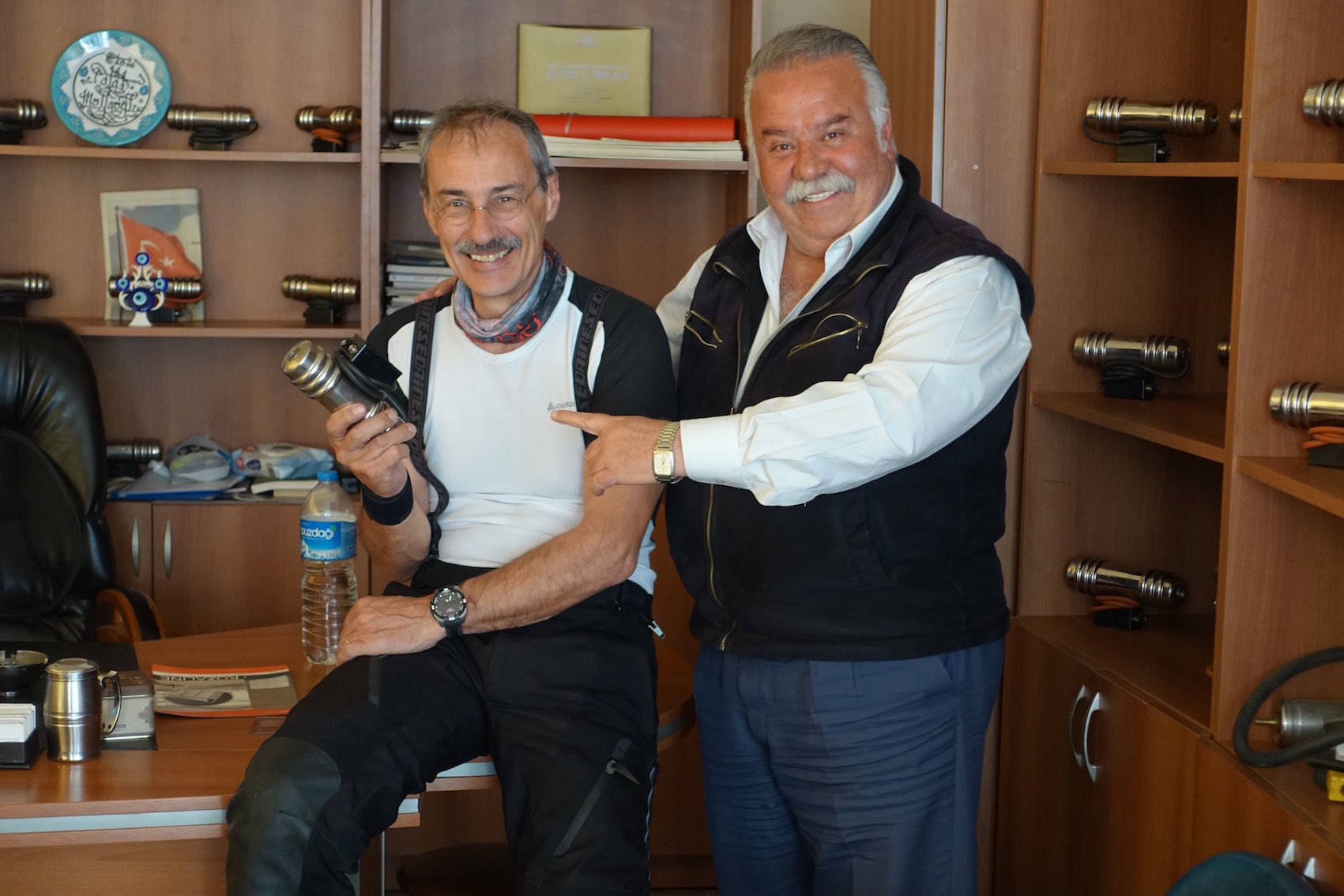
Talat mostra la sua scoperta…
Certo anche simpatico Talat, ma lascia disorientati e con un sacco di domande. Intanto ne ha dette peste e corna di Erdogan, paventandone un nuovo Hitler, ma poi queste pratiche da Far West veramente sorprendenti, anche nella Turchia di oggi. La pistola la giustifica ovviamente anche con riferimento ai terroristi che fa coincidere sostanzialmente con i Curdi… A questo punto ci guardiamo bene dall’addentraci in una discussione più differenziata. La pistola, con il colpo in canna, non la si vede ma è un monito.
Talat parla diverse lingue oltre al tedesco, ma non l’inglese. Si pavoneggia affermando di aver fatto il traduttore per la Merkel… Cresciuto a Berlino, una volta avuto figli, li ha portati in Turchia… per dargli un’educazione turca… poi non vuole che imparino altre lingue. Infatti il figlio, presente all’incontro, non biascica parole in altra lingua oltre al turco. Stranezze…
Il sito dell’azienda è, come dire, tosto, ma è difficile capire che cosa rappresenti. Una versione inglese non sembra esistere. A suo dire Talat venderebbe l’aggregato in centinaia di migliaia di esemplari in tutto il mondo e lo smercio l’avrebbe affidato agli ebrei… Offerte fino a tre miliardi… non le avrebbe accettate. Mah…
Viviamo un’esperienza un po’ surreale: la gentilezza e l’ospitalità turca che si rivelano più spettacolo di quanto si voleva immaginare. Attività economiche imperscrutabili che sanno in un qualche modo di copertura. Atteggiamenti da Far West. Ah, dimenticavo, Talat dice anche di aver passato qualche giorno in prigione perché recentemente avrebbe scritto direttamente una lettera Erdoan per non “mandargliele a dire”…
Ovviamente in un’atmosfera del tutto macho dove la presenza femminile non appare che in qualche riferimento alle donne facili… (solitamente russe, chissà poi perché…).
Mamma li turchi…
BILAL,kurd, from Dogubayazit, close to the border between Turky and Armenia |
Bilal, il proprietario del Teheran Boutique Hotel a Dogubayazit, si prende tempo per noi! Del resto, malauguratamente, non gli manca, perché i turisti e i viaggiatori verso e dall’Iran con l’intensificarsi del conflitto e in particolare con la presenza dei militari di Erdogan si sono fatti rari, anzi rarissimi. Per fortuna, mi dice, la banca è abbastanza flessibile e ammette dei ritardi fino a tre mesi nel pagamento degli interessi e quindi spera che qualche ospite nel suo nuovo albergo arrivi i prossimi mesi. Comunque, in trent’anni di attività, da ragazzo aveva iniziato con suo padre, ha vissuto tanti alti e bassi e l’ottimismo così come la gentilezza non gli fanno difetto. Allora gli chiedo come fa con le tasse. Cerco di pagarle, racconta, ma se non ci riesco non succede niente. L’amministrazione non è in grado di tenere la situazione sotto controllo. Da quando ho riaperto il nuovo Hotel è passato un anno è non si è ancora fatto vivo nessuno… Figurarsi se esiste un collaudo per l’igiene.
Ha quattro figli: il più grande di 19 anni aiuta nell’Hotel, il secondo ne ha 15, dovrebbe andare a scuola ma non ci va, il terzo e l’ultima bambina invece a scuola resistono, anche se malvolentieri. Al secondo ha detto: se non vai a scuola devi comunque fare gli esami a fine anno e così gli dà una mano a imparare qualcosa. Di per sé, la mancata frequenza comporterebbe una multa, ma, sorridendo, mi dice che finora non ne ha ricevute.
Tornando a Bilal, ho discusso a lungo sulla situazione dei curdi: in definitiva sperano un giorno di uscire da questa quasi perenne situazione di dramma. Sognano uno Stato loro e sperano che i turchi si rendano conto dei rischi che corrono con Erdogan e anche di quelli veicolati dall’Islam. Quanto sta succedendo con l’ISIS aprirebbe gli occhi a molti, ma è chiaro che il radicamento della cultura religiosa è profondo. Alcool se ne trova solo in negozi appositi e il muezzin ‘rompe’ cinque volte al giorno con la sua cantilena su Allah. Balil mi dice di aver chiesto di far abbassare il volume, ma è stato subito accusato di essere antiislamico e quindi è rientrato nei ranghi …
Quando partiamo il mattino ci saluta con cordialità e mostra emozioni… si vede che il contatto con altra gente gli fa in qualche modo bene.
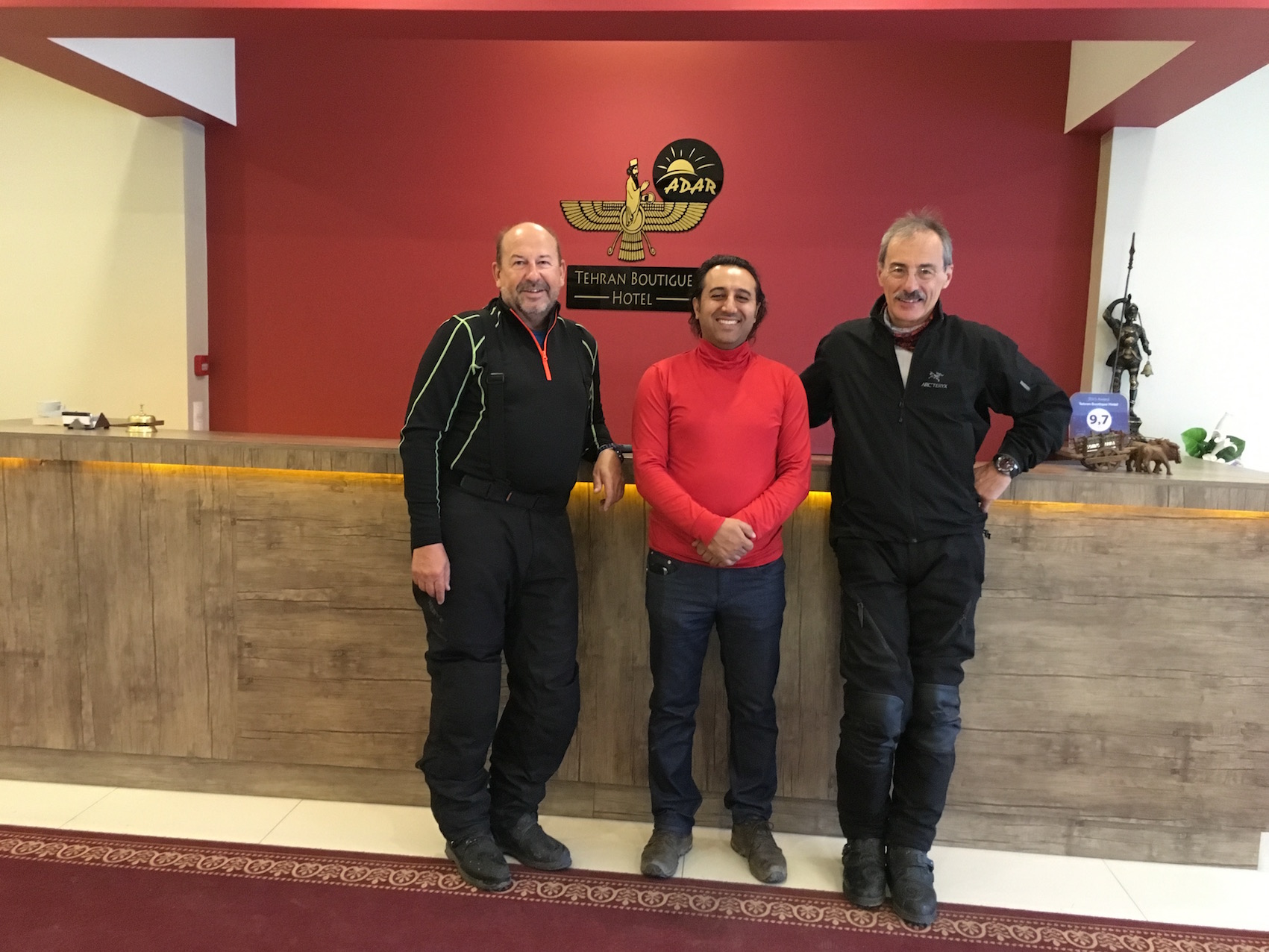
BILAL, prima di partire…
Bilal, the owner of the Tehran Boutique Hotel in Dogubayazit, takes time for us! Moreover, he has enough time,even though tourists and travelers to and from Iran are rare, very rare indeed as a consequnce of the intensification of the civil war and in particular of the the presence of Erdogan’s military. Fortunately, he says, the bank is quite flexible and admits delays of up to three months in the payment of interest and then he hopes that guests will arrive in his new hotel arrivals during the coming months. However, in thirty years of activity, he started with his father as a boy, he has experienced many ups and downs, so he has a lot of optimism and also kindness. I ask him how he copes with taxes. I try to pay them, he says, but if I cannot, usually nothing happens. The administration is not able to keep the situation under control. Since I opened the new Hotel a year has gone and I haven’t seen anybody of the administration… Imagine if there is a test for hygiene.
Bilal has four children: the oldest is 19 years and helps in the Hotel, the second is 15 and he should attend school but he doesn’t, only the last two, a girl and a boy, are resisting, even if unwillingly. To the second he said: if you don’t go to school you must make the exam at the end of the year exams and he tries to help him. Basically, missing the school carries a fine, but, smiling, he says that so far he hadn’t received any.
I discussed with Bilal at length on the situation of the Kurds: they hope one day to get out of this non-ending drama. They dream of an own State and they hope that the Turks will get aware of the risks connected with Erdogan and even those conveyed by Islam. What is happening with the ISIS would open the eyes of many, but it is clear that the roots of religious culture is profound. Here you can find alcohol only in special shops and the muezzin ‘calls’ five times a day with his chant of Allah. Balil tells me he asked to turn it down, but it was immediately accused of being anti-Islamic and then returned to the ranks …
When we start the morning he greets us warmly and he shows emotions … you see that contact with other people is important for him.
BUBA,from Tbilisi, Georgia |
Mit Buba treffen wir uns zum Nachtessen, nachdem wir ihn schon am Tage zuvor kennen lernen konnten. Ein erstaunlicher Mensch. Buba hat als Kind beide Hände verloren und heute fährt er dank medizinischer Technologie nicht nur Auto (notabene im Tbilisiverkehr!), sondern er ist auch Verantwortlicher der Abteilung für Entwicklung der georgischen Polizei und daneben Uniprofessor für internationales Recht. Er hat u.a. in Basel studiert. Sein Auftreten ist so umgänglich wie bestimmt: nichts von den Allüren der einstigen Nomenklatura. Wir unterhalten uns über alles: Politik, Geschichte Erziehungswesen, …. Georgien, so erklärt er uns, sei in einer radikalen Umbruchphase und, trotz den immensen Schwierigkeiten, auf dem Weg zur Demokratie. Als Beispiel erwähnt er das Polizeikorp. Dieses sei völlig korrupt gewesen. In der Zwischenzeit wurden die meisten Mitglieder des Korps entlassen, die Neuen werden ausgebildet und mit guten Salären ausgestattet, sodass sie ohne Probleme eine Familie unterhalten können. Damit fallen die meisten Korruptionsgründe weg. Wir haben in Tbilisi tatsächlich eine zuvorkommende und freundliche Polizei erlebt.
Das Streben nach Europa und zum Westen, das u.a. schon durch Schewardnadse eingeleitet worden war und auch in der quasi ostentativen (zumindest gegenüber den Russen) zur Schau gestellten europäischen Flagge zum Ausdruck komme, habe auch in einem Grossteil der Bevölkerung Fuss gefasst. Mit der Situation der abtrünnigen Regionen Südossezien und Abkasien müsse man leben, da natürlich die russischen Interessen damit verbunden seien. Sicher ist: Wenn Georgien auf solche Persönlichkeiten wie Buba – und vielleicht auch etwas weniger Oligarchen hätte – zählen kann, dann dürfte die Zukunft in Richtung Demokratie eigentlich auf bestem Wege sein…
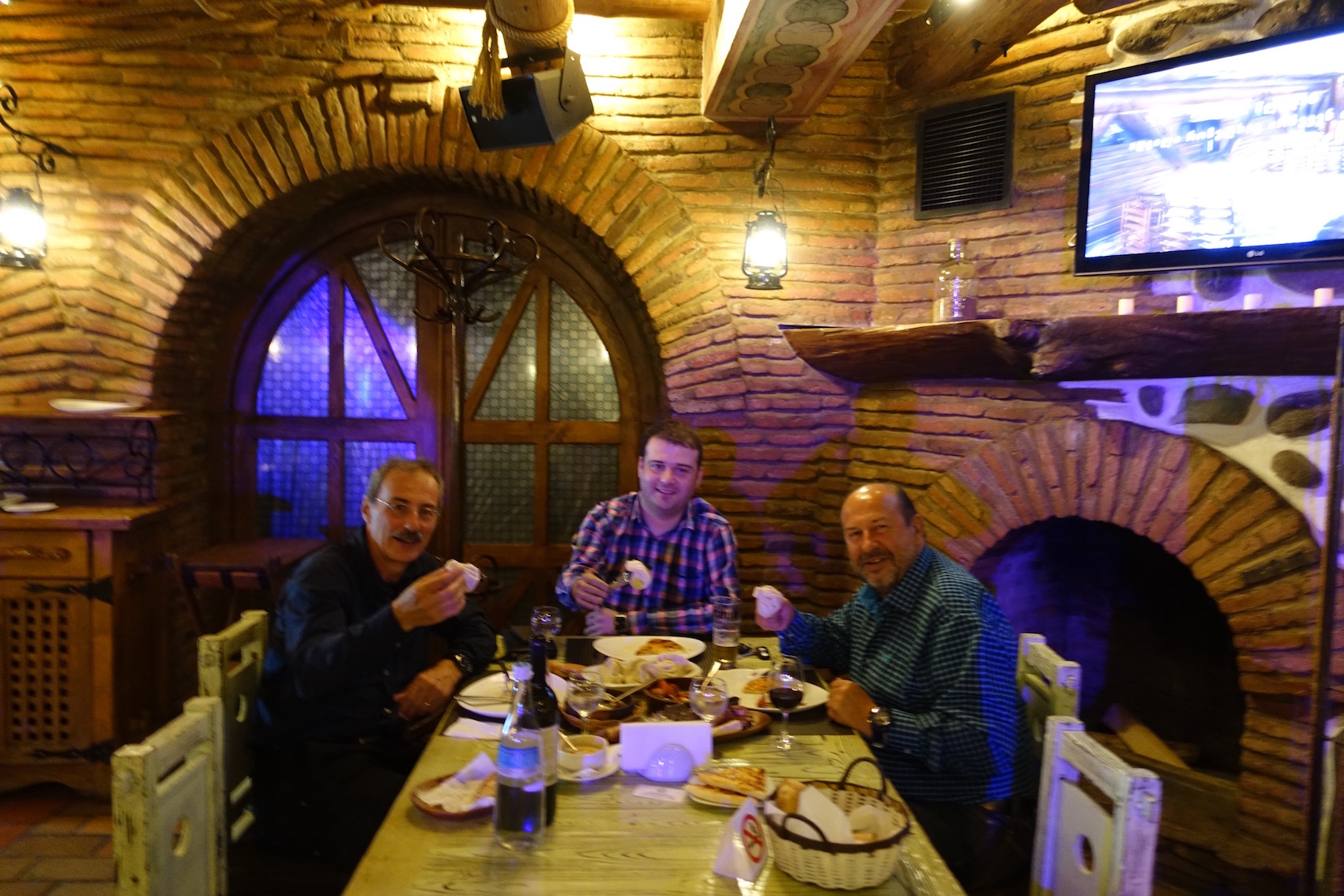
Con BUBA a cena…
We meet Buba for dinner after having seen him already on the previous day. An amazing man. As a child he lost both hands and now not only drives a car thanks to medical technology (nota bene in Tbilisitraffic!), but he is in Charge of the development Office of Georgian police and besides university professor for international law. He also studied in Basel. His appearance is as affable as determined: nothing of the attitude of the former nomenklatura. We talk about everything: politics, history education, …. Georgia, so he tells us, is in a radical upheaval and, despite the immense difficulties on the road to democracy. As an example he mentioned the Police. This was totally corrupt. In the meantime, most of the members of the Corps were dismissed, the new are trained and get good salaries, so that they can maintain a family without problems. Thus most corruption reasons are eliminated. We really experienced in Tbilisi a courteous and friendly police.
Striving for Europe and the West, which, inter alia, had already been initiated by Shevardnadze and also find an expression in the quasi ostentatious (at least relative to the Russians) showing of the European flag, have also gained a foothold in a majority of the population. One has to live with the situation of the breakaway regions of South-Ossetia and Abkhazia, because the Russian interests are associated with them. One thing is certain: If Georgia can count on such personalities as Buba – could and perhaps slightly less oligarchs -, then the future towards democracy should really be on a good way …
| SIRANOUSH and ANDRANIK, Yerevan, Armenia |
When, already from Tbilisi, I phoned Siranoush and her son Andranik their kindness was perceptible and got concrete during the days spent in Yerevan.
Thanks to the expert guidance of Siranoush we discover Yerevan with its architectural richness, but also with its intense life, which, especially on Sundays, takes place in the many parks and expresses a lot of joy. But Yerevan, unlike e.g. Tbilisi, is an introverted town, expressing calm and reflexivity. One can feel the history of Armenia, which is almost palpable.
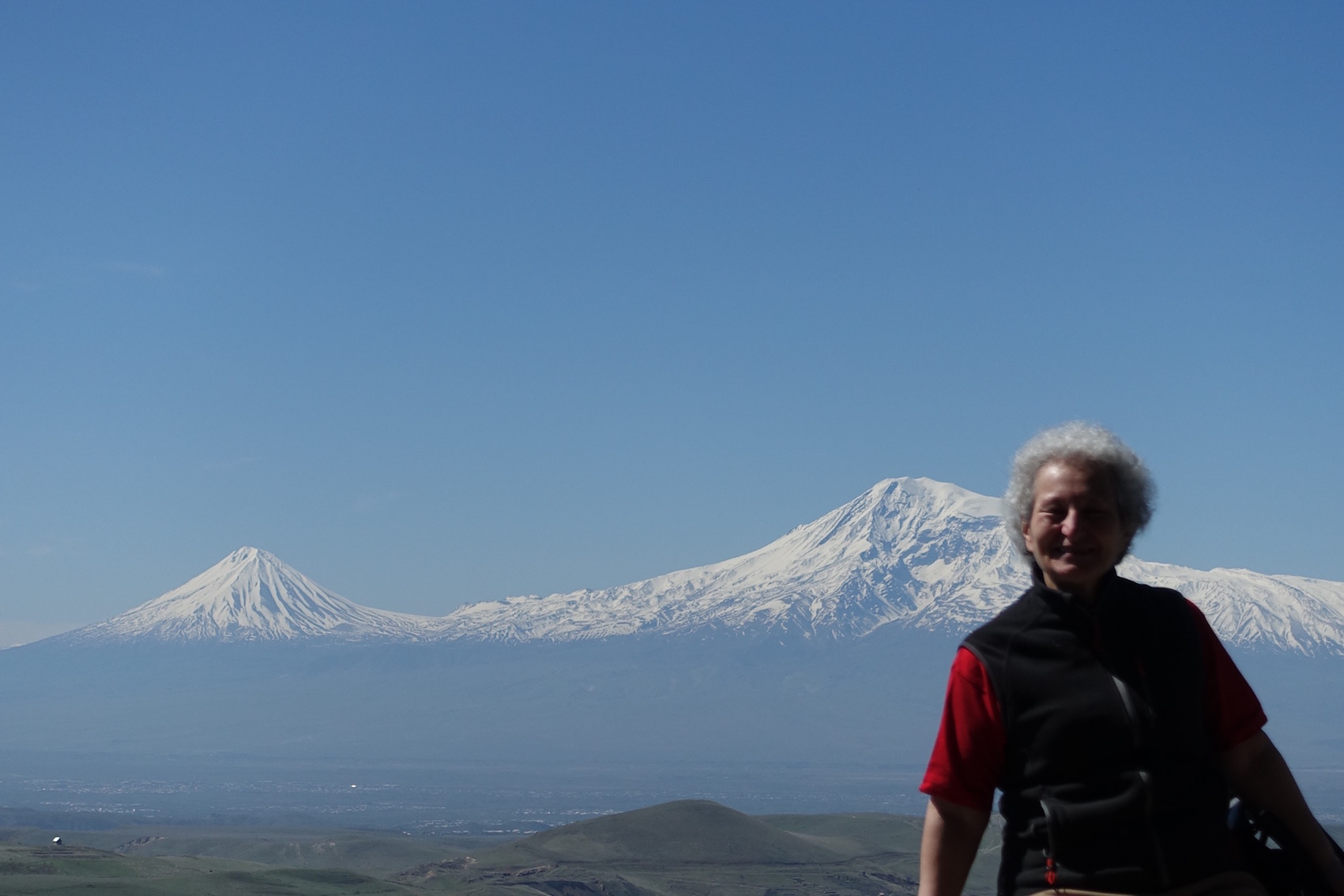
ANDRANOUSH. All’orizzonte l’Ararat….
Siranoush works for charitable Foundation for Orphaned. She cancelled all commitment in order to accompany us also on a trip to Gori, where we can admire the heritage of Hellenistic-Roman tradition and a beautiful monastery. The drive there takes place with a taxi. Ever, the city is full of taxis, i.e of men trying to earn their livelihood with their car. In fact, the living conditions are very difficult in all the country, just like the political situation, which is dominated by the Soviet-inspired oligarchs. It seems that the corridor to Russia through Georgia cannot bring very much and the country can survive especially thank to the many Armenians from the diaspora, who provide a certain cash flow. It is difficult to understand why Armenia still keeps on a lead Russia’s. Siranoush gives me a statement: “We have no choice, we are trapped and somehow Russia provides for a certain security, especially against the Turks.” Because the Turks are still the biggest threat. And Siranoush, who speaks perfect English, and has a deep knowledge of the history and culture of his country, confide that the ‘best revenge’ against the Turks is that Armenia continue to exist in spite of repeated attempts to destruction of his people.
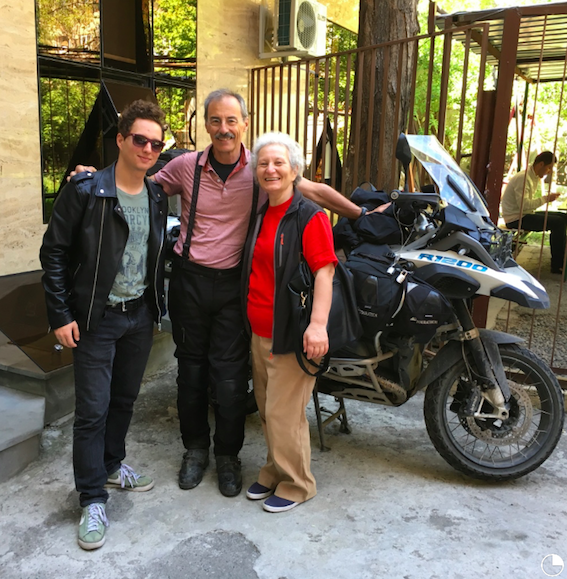
With Siranoush and Andranik, before starting
Andranik is studying photography and film. He has many tests during these days, but he is also a motorcycle-fan and therefore he doesn’t want to give up a trip to the south…
Thank you so much Siranoush an Andranik. You both were very lovely. We will not forget what you have done for us. Whenever you want to come to Switzerland or Germany you will be welcome. For Andranik: if you need a stage some where in Europe, we will try to find something for you.
| SAHAR and MEHRAN, from Isfahan and Mashhad, Iran |
Sahar and Mehran are an authentic expression of Iran’s best we were lucky to discover. As well as you can often establish a spontaneous and authentic relationship with people on the streets, squares or in restaurants, so even with Sahar who works at the Hotel in Isfahan and Mashhad who comes from Mehran but we met him in Kroh in the desert, the contact was instinctive, facilitated by the welcoming smile of Sahar and the open availability of Mehran.
To them I wrote a letter (see. article of the 26th of June) that I propose again below.
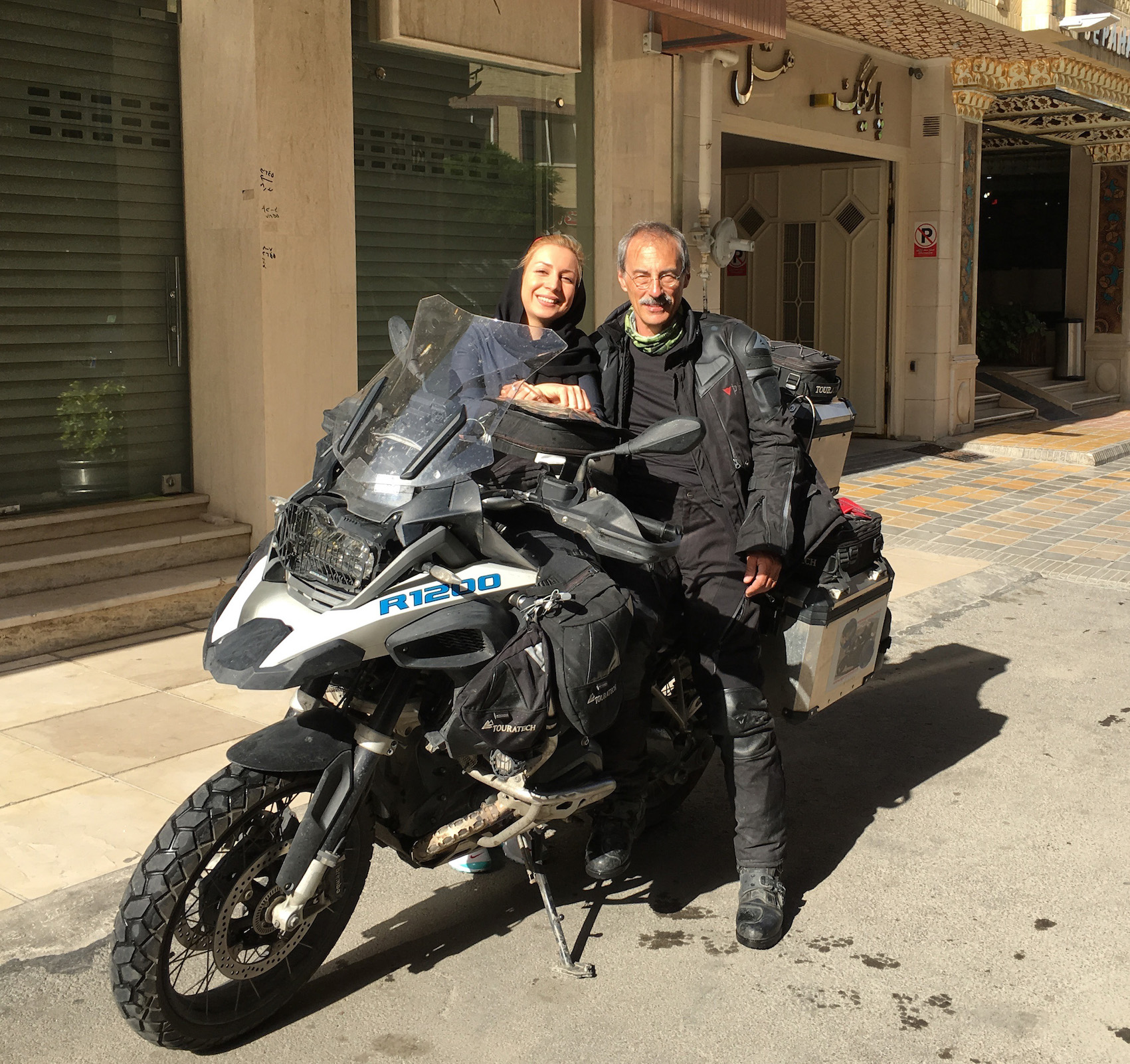
With Sahar…
Sahar e Mehran sono un’espressione autentica dell’Iran migliore che abbiamo avuto la fortuna di scoprire. Così come con la gente sulla strada, nelle piazze o nei ristoranti si instaura sovente un rapporto spontaneo e autentico, così anche con Sahar che lavora all’Hotel di Isfahan e con Mehran che è di Mashhad, ma che abbiamo incontrato a Kroh nel deserto, il contatto è stato istintivo, facilitato dal sorriso accogliente di Sahar e dalla disponibilità aperta di Mehran.
A loro ho scritto una lettera (cfr. articolo del 26 giugno) che ripropongo di seguito.
Dear Sahar and Mehran,
While you do not know one another, you have something in common, your Iranian nationality: Sahar from Ifsahan, and Mehran from Mashhad. Who knows, maybe your paths will cross one day …
You are probably wondering why I am writing you. When I set out to travel around the world I knew I would have had some experiences that would amaze and surprise me. And so it was… meeting you two was one of the most beautiful surprises I had during my journey, together with the discovery of your lovely country, Iran.
While the visits of getting to know Mehran and his family in the desert, and Sahar in the heavenly city of Isfahan were short, yet intense, they gave me the sense of what I experience in Iran, a country so unique from others. Your hospitality, kindness and desire to meet others is truly a positive and comforting characteristic. You were able to make a stranger feel like a guest wherever he/she went whether young or old, in hotels or anywhere on the street.
I also enjoyed my encounters with the traffic police. They were intrigued by our motorcycles, and often stopped us during our journey. Surprisingly, they only wanted to welcome us to Iran and to wish us a safe journey…
As in ancient times, hospitality seems to have remained something sacred.
Spontaneously opening the door of your house to a traveller, sharing something with him/her, gave rise to the ritual of exchange. This proves to be the essence of a culture of hospitality, but that is also one of the moral foundations of Islam.
All religions have regarded hospitality as an important value. In the Qur’an, Islam considers the traveller to be a ‘son of the street’ to whom one owes the ‘zakat’ (alms), which is part of its half. I suppose you Iranians are interpreting in the best way this as one of the five principles of Islam.
What I experienced with you in Iran is the realization of what inspired me from the beginning of my journey. I hoped to make the world a meeting place, an agora, where men and women are mutually guests, and where the guest, as for the Romans (hospes in Latin), has the same rights as citizens.
Reflecting on these experiences I had in your country, dear Sahar and Mehran, I often compare it with my country, Switzerland, and the West to whom I owe my culture and my way of thinking and being. While the West is generally wealthy, it seems to be losing the culture of hospitality, part of its traditions.
What we are now experiencing in Switzerland, in Europe and America, especially in the US, is a strong re-emergence of the opposite of hospitality, in other words hostility. It is no coincidence that the words ‘hospitality’ and ‘hostility’ have the same linguistic root. In human existence they are opposites, but in reality, they are close to one another. Unfortunately in the West, hostility is fostered by a culture of individualism and egocentrism. As a result, this is beginning to take over and has resulted into racism.
Great Britain’s recent decision to abandon Europe, is mainly motivated by a fierce racism that doesn’t see in human being somebody to host but a real threat. Unfortunately a member of the British parliament in favor of Europe had to pay the price with her life: murdered in a racist rage. What is hard to imagine is that even in Britain, it is generally the people who have little to do with foreigners who see foreigners as a kind of enemy. In many countries, Switzerland included, we are experiencing similar racist attitudes and conflicts. The idea of Europe as a place of peace and hospitality is changing negatively and slowly becoming dimmer.
I know, dear Sahar and Mehran, that even in Iran, not everything that glitters is gold. As I have said to the Mullah in a nice discussion held at the Islamic Centre of Mashhad, one has to distinguish between what you see on the stage and what happens behind the scenes. And it is also true that the traveller – a term that I prefer to that of ‘tourists’ – cannot see everything … Yet we hope Iran will not lose its great qualities and human resources.
Perhaps I will write again … In the meantime, I wish you all the best.
